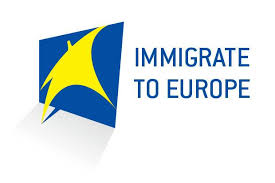A Comprehensive Guide to Immigration to Europe
Europe is a popular destination for immigrants due to its diverse cultures, economic opportunities, high quality of life, and robust social systems. However, the process of immigrating to Europe can be complex and varies significantly from one country to another. This guide provides a detailed overview of the immigration process to Europe, covering general requirements, specific pathways, and important considerations for prospective immigrants.

1. General Requirements for Immigration to Europe
While each European country has its own specific immigration laws and requirements, there are some general criteria that most countries share:
Legal Entry and Visa Requirements
- Visa: Most non-EU/EEA nationals need a visa to enter a European country. There are different types of visas depending on the purpose of the visit: tourist visas, business visas, student visas, and work visas.
- Valid Passport: A valid passport is required to apply for a visa and to enter any European country.
- Proof of Financial Stability: Applicants often need to show proof of financial means to support themselves during their stay.
- Health Insurance: Many countries require proof of health insurance coverage.
Background Checks
- Criminal Record Check: Applicants may need to provide a police clearance certificate to prove they have no criminal record.
- Health Examination: A medical examination may be required to ensure the applicant does not have any communicable diseases.
2. Pathways to Immigration
There are several pathways to immigrating to Europe, depending on the individual’s situation and purpose of moving. Here are the most common ones:

Employment-Based Immigration
One of the most common pathways is through employment. Each country has its own system for granting work permits and visas:
- Job Offer: Securing a job offer from a company in the desired country is usually the first step. The employer often sponsors the work permit application.
- Work Visa: After securing a job offer, the applicant must apply for a work visa. This often requires proof of the job offer, qualifications, and sometimes language proficiency.
- EU Blue Card: For highly skilled workers, the EU Blue Card is a popular option. It allows non-EU citizens to live and work in an EU country. Requirements include a job offer with a high salary and proof of higher education qualifications.

Student Immigration
Studying in Europe is another pathway that can eventually lead to permanent residency:
- Acceptance Letter: The first step is to gain admission to a recognized educational institution in the desired country.
- Student Visa: Once admitted, the student must apply for a student visa. This usually requires proof of admission, financial means, and health insurance.
- Post-Graduation Work Opportunities: Many European countries offer options for students to stay and work after graduation, which can be a pathway to permanent residency.
Family Reunification
Family reunification allows family members of residents or citizens to immigrate:
- Sponsorship: The resident or citizen must sponsor the family member’s application.
- Proof of Relationship: Documentation proving the familial relationship is required.
- Financial Means: The sponsor may need to prove they have sufficient income to support the family member.
Asylum and Refugee Status
Individuals fleeing persecution or conflict can apply for asylum or refugee status:
- Application: Asylum seekers must apply for protection in the country where they seek refuge.
- Interview and Assessment: The applicant will undergo an interview and assessment process to determine eligibility.
- Protection Status: If granted, the individual receives protection status and can eventually apply for permanent residency.
Investment and Business Immigration
Some European countries offer residency through investment or business activities:
- Investment Programs: Countries like Portugal and Greece offer “Golden Visa” programs, where individuals can obtain residency by making a significant investment in the country (e.g., real estate, business).
- Entrepreneur Visas: These visas are for individuals who plan to start or invest in a business in the host country. Requirements typically include a solid business plan and financial investment.
3. Country-Specific Immigration Processes
Each European country has its own specific procedures and requirements for immigration. Here are examples from a few popular destinations:
Germany
- Economic Immigration: Germany has a strong economy with a high demand for skilled workers, particularly in sectors like engineering, IT, healthcare, and manufacturing. The country operates several immigration programs aimed at attracting skilled workers from abroad. The Blue Card scheme, for instance, allows highly qualified non-EU citizens to live and work in Germany.
- Asylum Seekers and Refugees: Germany has been a destination for many asylum seekers and refugees, especially during the European migrant crisis that peaked in 2015. The country has a well-established system for processing asylum claims and providing support to refugees. However, the influx of refugees has also sparked debates about integration, social cohesion, and the strain on public resources.
- Family Reunification: Like many other countries, Germany allows for family reunification, enabling immigrants to bring their immediate family members to join them in the country. However, the rules and criteria for family reunification can vary depending on the immigration status of the individual and other factors.
- Integration Policies: Germany has implemented various integration policies aimed at helping immigrants adapt to German society, including language courses, job training programs, and initiatives to promote cultural exchange and understanding.
- Challenges and Debates: Immigration is a topic of ongoing debate in German politics and society. While many Germans recognize the economic and cultural benefits of immigration, there are also concerns about issues like social cohesion, security, and the impact on the labor market. Debates around immigration often intersect with discussions about identity, multiculturalism, and national values.
Overall, immigration has played a significant role in shaping Germany’s demographic landscape and will likely continue to be a prominent issue for the country in the years to come
- Cultural Differences: Understanding and adapting to the local culture is important for successful integration.
- Support Networks: Building a support network of friends, colleagues, or community groups can help ease the transition.
Legal Assistance
- Immigration Lawyers: Navigating the immigration process can be complex. Consulting with an immigration lawyer can help ensure all legal requirements are met and can provide guidance through the application process.
- Legal Aid: Some countries offer legal aid or resources for immigrants, particularly for asylum seekers and refugees.
Housing and Living Costs
- Cost of Living: Researching the cost of living in the desired country and city is crucial for financial planning.
- Housing Market: Understanding the housing market and rental process can help in finding suitable accommodation.
5. Long-Term Residency and Citizenship
Many immigrants aim for long-term residency or citizenship after moving to Europe:
Permanent Residency
- Eligibility: Requirements for permanent residency vary by country but generally include a minimum period of legal residence, proof of financial stability, and sometimes language proficiency.
- Benefits: Permanent residents enjoy many of the same rights as citizens, including access to social services and the labor market.
Citizenship
- Naturalization: After a certain period of residency, immigrants may be eligible to apply for citizenship. This process often requires passing a language and civics test.
- Dual Citizenship: Some countries allow dual citizenship, while others require individuals to renounce their previous citizenship.

Conclusion
Immigrating to Europe involves navigating a complex landscape of legal requirements, visa applications, and country-specific regulations. Whether through employment, education, family reunification, or investment, understanding the general and specific pathways to immigration can help prospective immigrants make informed decisions and successfully transition to life in Europe. By thoroughly researching the requirements, preparing necessary documentation, and seeking professional guidance, individuals can increase their chances of a smooth and successful immigration process.


